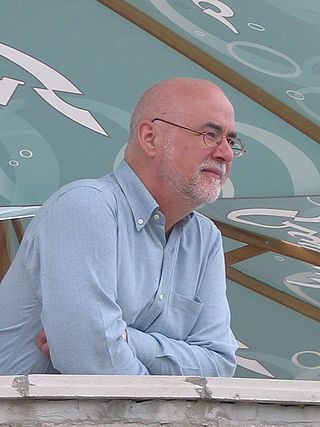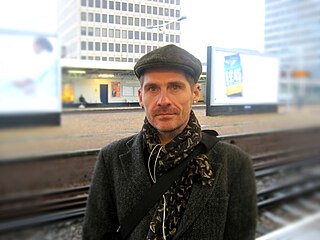
Sorley MacLean was a Scottish Gaelic poet, described by the Scottish Poetry Library as "one of the major Scottish poets of the modern era" because of his "mastery of his chosen medium and his engagement with the European poetic tradition and European politics". Nobel Prize Laureate Seamus Heaney credited MacLean with saving Scottish Gaelic poetry.
Alasdair mac Mhaighstir Alasdair, legal name Alexander MacDonald, or, in Gaelic Alasdair MacDhòmhnaill, was a Scottish war poet, satirist, lexicographer, political writer and memoirist. The poet's Gaelic name means "Alasdair, son of the Reverend Alasdair". His father, also named Alasdair, was known as Maighstir Alasdair which was then the way of referring to a clergyman in Scottish Gaelic. In English, Maighstir Alasdair was known as the "Reverend Alexander MacDonald".

Anna "Nan" Shepherd was a Scottish Modernist writer and poet, best known for her seminal mountain memoir, The Living Mountain, based on experiences of hill walking in the Cairngorms. This is noted as an influence by nature writers who include Robert Macfarlane and Richard Mabey. She also wrote poetry and three novels set in small fictional communities in Northern Scotland. The landscape and weather of this area played a major role in her novels and provided a focus for her poetry. Shepherd served as a lecturer in English at the Aberdeen College of Education for most of her working life.
Mary Dorcey is an Irish author and poet, feminist, and LGBT+ activist. Her work is known for centring feminist and queer themes, specifically lesbian love and lesbian eroticism.
Derick Smith Thomson was a Scottish poet, publisher, lexicographer, academic and writer. He was originally from Lewis, but spent much of his life in Glasgow, where he was Professor of Celtic at the University of Glasgow from 1963 to 1991. He is best known for setting up the publishing house Gairm, along with its magazine, which was the longest-running periodical ever to be written entirely in Gaelic, running for over fifty years under his editorship. Gairm has since ceased, and was replaced by Gath and then STEALL. He was an Honorary President of the Scottish Poetry Library, and a Fellow of the Royal Society of Edinburgh and the British Academy. In June 2007, he received an honorary degree from Glasgow University.
Raman Mundair is a British poet, writer, artist and playwright. She was born in Ludhiana, India and moved to live in the UK at the age of five. She is the author of two volumes of poetry, A Choreographer's Cartography and Lovers, Liars, Conjurers and Thieves – both published by Peepal Tree Press – and The Algebra of Freedom published by Aurora Metro Press. She edited Incoming – Some Shetland Voices – published by Shetland Heritage Publications. Mundair was educated at the School of Oriental and African Studies, University of London, and has performed readings of her work at numerous venues Raman's work has been anthologised and received reviews in publications including The Independent, The Herald, World Literature Today and Discovering Scottish.

Christopher Whyte is a Scottish poet, novelist, translator and critic. He is a novelist in English, a poet in Scottish Gaelic, the translator into English of Marina Tsvetaeva, Pier Paolo Pasolini and Rainer Maria Rilke, and a critic of Scottish and international literature. His work in Gaelic appears under the name Crìsdean MacIlleBhàin.
Robert Crawford is a Scottish poet, scholar and critic. He is emeritus Professor of English at the University of St Andrews.

Sepideh Jodeyri is an Iranian poet, literary critic, translator and journalist living in Washington DC, United States.
Kate Clanchy MBE is a British poet, freelance writer and teacher.
Scottish Gaelic literature refers to literary works composed in the Scottish Gaelic language, which is, like Irish and Manx, a member of the Goidelic branch of Celtic languages. Gaelic literature was also composed in Gàidhealtachd communities throughout the global Scottish diaspora where the language has been and is still spoken.

Kevin MacNeil is a Scottish novelist, poet, screenwriter, lyricist and playwriter. He was born and raised on the Isle of Lewis in the Outer Hebrides.
Marion Emily Angus (1865–1946) was a Scottish poet who wrote in the Scots vernacular or Braid Scots, defined by some as a dialect of English and others as a closely related language. Her prose writings are mainly in standard English. She is seen as a forerunner of a Scottish renaissance in inter-war poetry – her verse marks a departure from the Lallans tradition of Robert Burns towards that of Hugh MacDiarmid, Violet Jacob and others.
Events from the year 1959 in Scotland.

Poetry of Scotland includes all forms of verse written in Brythonic, Latin, Scottish Gaelic, Scots, French, English and Esperanto and any language in which poetry has been written within the boundaries of modern Scotland, or by Scottish people.
The poet William Livingston (1808–1870) was a Scottish Gaelic poet from Bowmore, Islay and important figure in 19th-century Scottish Gaelic literature.
William Ross was a Scottish writer of Romantic poetry in Scottish Gaelic from the Isle of Skye and a parish schoolmaster, who is often referred to as, "The Bard of Gairloch." According to Derick S. Thomson, "Ros is justly regarded as the leading poet of love of the eighteenth century." Despite being widely viewed, however, as a, "love-lorn romantic who died of unrequited love", Ross was also very capable of poking fun at himself. More than two hundred years after his death, Ross remains a highly important and admired figure in Scottish Gaelic literature. Along with his iconic eulogy for the 1788 death of Prince Charles Edward Stuart, one of Ross' most famous songs is the lament, Cuachag nan Craobh, the tune of which is now known throughout the Anglosphere as The Skye Boat Song, based on multiple sets of Scottish English lyrics composed a century later.
Dòmhnall MacAmhlaigh was a Scottish Gaelic poet and professor.
Regi Claire, is a novelist, short story writer and poet living and working in Scotland. Her native language is Swiss-German, but she writes in English, her fourth language.

Anne Frater is a Scottish poet. She was born in Stornoway (Steòrnabhagh), in Lewis on the Western Isles. She was brought up in the village of Upper Bayble in the district of Point, a small community which has also been home to Derick Thomson and Iain Crichton Smith.







